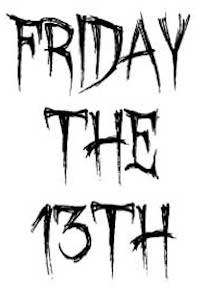
Well here we are early into the new year and already faced with that unluckiest of days — Friday the 13th. This day is so bad that there are two terms — paraskavedekatriaphobia and friggatriskaidekaphobia — that describe fear of this unlucky day. The fear of Friday the 13th is officially called friggatriskaidekaphobia. Frigga refers to the Norse god for which Friday is named and triskaidekaphobia means fear of the number 13. An alternate term for the anxiety is paraskavedekatriaphobia. Originating from Greek, paraskevi means Friday, dekatria refers to “thirteen,” and phobia translates as “fear.”
Many people hold fast to the belief that Friday the 13th brings bad luck. My extensive research couldn’t come up with when this belief began, but “bad luck” superstitions have swirled around the number 13 for centuries.
Western cultures have historically associated the number 12 with completeness…. there are 12 days of Christmas, 12 months, 12 zodiac signs, 12 labors of Hercules, 12 gods of Olympus, 12 tribes of Israel, etc. But the number 13 has a long history of “bad luck.”
One group of superstitious people use the fact that the ancient Code of Hammurabi omitted a 13th law from its list of legal rules as “proof” of 13’s negative association. (The Code of Hammurabi was one of the earliest and most complete written legal codes and was proclaimed by the Babylonian King Hammurabi, who reigned from 1792 to 1750 B.C.)
Some people point to the Bible, citing that 13 guests attended the Last Supper — the seating arrangement at the Last Supper is believed to have given rise to the longstanding Christian superstition that having 13 guests at a table was a bad omen.
The Bible even supposedly supports the association of Friday with bad luck — Jesus was crucified on a Friday, Friday is also said to be the day Eve gave Adam the apple and the day Cain killed his brother, Abel.
In the late 19th century, a New Yorker, Captain Williams Fowler sought to remove the stigma surrounding the number 13 — and particularly the unwritten rule about not having 13 guest at a dinner table — by founding an exclusive society called the Thirteen Club. The group dined regularly on the 13th day of the month in room 13 of the Knickerbocker Cottage. Before sitting down for a 13-course dinner, members would pass beneath a ladder and a banner reading “Morituri te Salutamus,” Latin for “Those of us who are about to die salute you.”
But do bad things actually happen on Friday the 13th? One famous story is that on Friday, October 13th, 1307, officers of King Philip IV of France arrested hundreds of the Knights Templar, essentially wiping them out. Actually some knights were arrested on that date, but it had nothing to do with the superstition.
According to some estimates, the modern fear of Friday the 13th contributes to a routine loss of between $700 million and $900 million in revenue that would otherwise be gained on that day — all because most people don’t want to push their luck. You can fly cheaper on Friday the 13th, because most people don’t want to be in the air on that unlucky day. And stock prices tend to fall on Friday the 13th.
There will only be one more Friday the 13th this year…. in October.
So as far as I can tell, there’s no compelling evidence that anything historically bad ever actually occurred on a Friday the 13th that supports the superstition — there’s no need to fear the day, or to refrain from doing any of the normal things you’d otherwise do. But……
— 30 —
